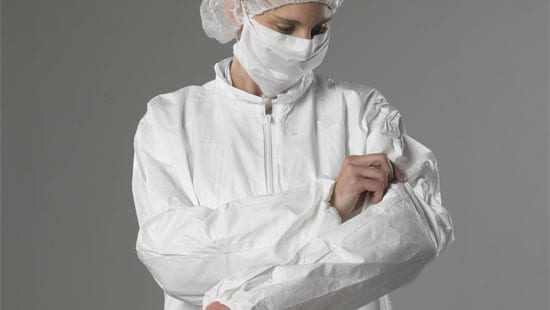Part II - the clean room
This installment will describe what we technicians do on a typical day when we are assigned to work in the clean room.
Within the pharmacy, there's a room called the anteroom, which is where you scrub up and gather supplies before entering the clean room. In part 3 I will describe the anteroom in more detail. The clean room is where we make sterile products, like IV antibiotics. Since these products go directly into a patient's vein, proper hand washing and garbing is extremely important, as well as keeping the clean room free of contaminants and particles. Everything that is brought into the clean room is wiped down with antibacterial wipes. Garbing has to be done in a certain order, going from dirty to clean. These are the steps we follow.
 |
| bunny suit |
 |
| surgical hand scrub |
1. Put on booties, then bouffant cap. Enter anteroom.
2. Put on face mask.
3. Step into bunny suit (lint-free coveralls) and pull it up to your waist.
4. Scrub hands, including fingernails, and arms up to elbows with surgical scrub.
5. After drying hands and arms, finish putting on bunny suit.
6. Enter clean room and use hand sanitizer, then don sterile gloves.
If you go back into the anteroom for something, you have to change your gloves before working in the clean room again. While compounding sterile products, we periodically spray our gloves with alcohol to keep them sanitized.
The products are made in a laminar air flow hood, which uses filters and air flow to keep out particles. It is important to not block air flow to the "critical point" where you inject or withdraw the drug. Syringes have to be handled in such a way that you do not touch the main part of the plunger, which could contaminate the product in the syringe. Learning how to hold the vials so that you are not blocking air flow while at the same time using the syringe correctly is difficult at first. All products wrapped in sterile packaging, like needles and syringes, need to be opened in the hood. If you take your syringe out of the hood, you can no longer use it because it is contaminated. It needs to be drilled into your mind to "stay in the hood."
 |
|
As for what kind of products we actually make, there are certain medications that we batch and always keep on hand. The tech working in the anteroom decides which medications need to be batched for the day. Many of the drugs come in powder form and we reconstitute them. They are then injected into an IV bag or syringe. Usually there is a pharmacist and a tech in the clean room. The pharmacist mostly watches the tech to make sure the correct sterile technique and right amount of drug is being used. This varies though depending on who your pharmacist is. Some pharmacists supervise and let the techs do the work, and others pitch in and help if there is a lot to get done. It is important to understand math and proportions when making IV medications. Here's an example: vancomycin powder is reconstituted with 100 mL of sterile water. The resulting concentration is 500 mg/10 mL. We are batching 1500 mg of vancomycin in 500 mL 0.9% sodium chloride. How many mL's do you inject into the 500 mL bag to result in 1500 mg of vancomycin? I'll let you tell me the answer. 😊 This is an actual drug and concentration that we do all the time.
Cleaning is another important part of working in the clean room. Before we start in the morning, we clean the hoods (we have a 4 ft. and a 6 ft. hood) using a 3 step process. It has to be done in a certain order because of the air flow - from back to front, and top to bottom. The process is repeated in the evening when we are done for the day. We also have to take out the trash and wipe down counters before we can exit and take off our garb. It gets hot wearing that suit, mask, cap, and gloves!
When I first started in the clean room I thought it was horrible. It's a small room with only a pass-through window looking into the anteroom. You have no way of knowing if it's a beautiful sunshiny day or cold, gray, and rainy. Drinks and phones of course are not allowed, and if you have to go to the bathroom or blow your nose, you have to go through the whole garbing and scrubbing process again. We are in there for hours at a time, mostly standing in one place, which can give you sore legs, feet, and back. Learning the sterile technique and how to manipulate a syringe and needle was so unnatural and awkward for me. After awhile, when I felt more comfortable and knew a little more what I was doing, I started liking it! There's no constantly ringing phones. The hoods make a calming droning sound and you can just kind of get in a zone and block everything out. At this point, I prefer the clean room over any other position!
Sometimes crazy stuff happens and you have to do stat drips for someone who is coding, or a patient has an emergency surgery, etc. I have more stories to tell but I think this is long enough. Hopefully the details were not too monotonous!















